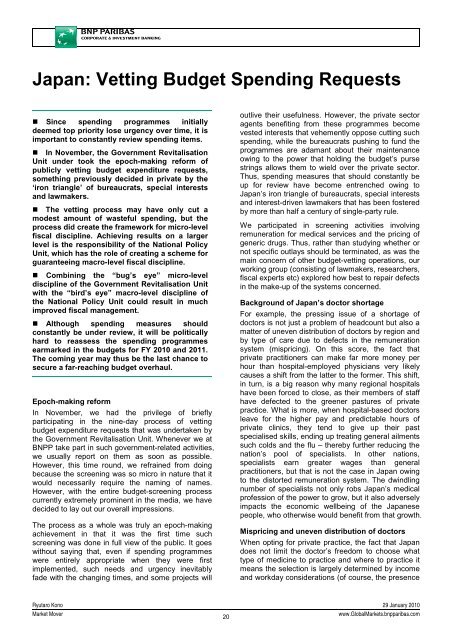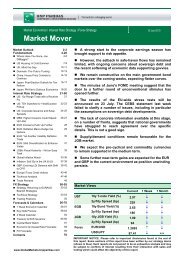Market Outlook - BNP PARIBAS - Investment Services India
Market Outlook - BNP PARIBAS - Investment Services India
Market Outlook - BNP PARIBAS - Investment Services India
You also want an ePaper? Increase the reach of your titles
YUMPU automatically turns print PDFs into web optimized ePapers that Google loves.
Japan: Vetting Budget Spending Requests<br />
• Since spending programmes initially<br />
deemed top priority lose urgency over time, it is<br />
important to constantly review spending items.<br />
• In November, the Government Revitalisation<br />
Unit under took the epoch-making reform of<br />
publicly vetting budget expenditure requests,<br />
something previously decided in private by the<br />
‘iron triangle’ of bureaucrats, special interests<br />
and lawmakers.<br />
• The vetting process may have only cut a<br />
modest amount of wasteful spending, but the<br />
process did create the framework for micro-level<br />
fiscal discipline. Achieving results on a larger<br />
level is the responsibility of the National Policy<br />
Unit, which has the role of creating a scheme for<br />
guaranteeing macro-level fiscal discipline.<br />
• Combining the “bug’s eye” micro-level<br />
discipline of the Government Revitalisation Unit<br />
with the “bird’s eye” macro-level discipline of<br />
the National Policy Unit could result in much<br />
improved fiscal management.<br />
• Although spending measures should<br />
constantly be under review, it will be politically<br />
hard to reassess the spending programmes<br />
earmarked in the budgets for FY 2010 and 2011.<br />
The coming year may thus be the last chance to<br />
secure a far-reaching budget overhaul.<br />
Epoch-making reform<br />
In November, we had the privilege of briefly<br />
participating in the nine-day process of vetting<br />
budget expenditure requests that was undertaken by<br />
the Government Revitalisation Unit. Whenever we at<br />
<strong>BNP</strong>P take part in such government-related activities,<br />
we usually report on them as soon as possible.<br />
However, this time round, we refrained from doing<br />
because the screening was so micro in nature that it<br />
would necessarily require the naming of names.<br />
However, with the entire budget-screening process<br />
currently extremely prominent in the media, we have<br />
decided to lay out our overall impressions.<br />
The process as a whole was truly an epoch-making<br />
achievement in that it was the first time such<br />
screening was done in full view of the public. It goes<br />
without saying that, even if spending programmes<br />
were entirely appropriate when they were first<br />
implemented, such needs and urgency inevitably<br />
fade with the changing times, and some projects will<br />
outlive their usefulness. However, the private sector<br />
agents benefiting from these programmes become<br />
vested interests that vehemently oppose cutting such<br />
spending, while the bureaucrats pushing to fund the<br />
programmes are adamant about their maintenance<br />
owing to the power that holding the budget’s purse<br />
strings allows them to wield over the private sector.<br />
Thus, spending measures that should constantly be<br />
up for review have become entrenched owing to<br />
Japan’s iron triangle of bureaucrats, special interests<br />
and interest-driven lawmakers that has been fostered<br />
by more than half a century of single-party rule.<br />
We participated in screening activities involving<br />
remuneration for medical services and the pricing of<br />
generic drugs. Thus, rather than studying whether or<br />
not specific outlays should be terminated, as was the<br />
main concern of other budget-vetting operations, our<br />
working group (consisting of lawmakers, researchers,<br />
fiscal experts etc) explored how best to repair defects<br />
in the make-up of the systems concerned.<br />
Background of Japan’s doctor shortage<br />
For example, the pressing issue of a shortage of<br />
doctors is not just a problem of headcount but also a<br />
matter of uneven distribution of doctors by region and<br />
by type of care due to defects in the remuneration<br />
system (mispricing). On this score, the fact that<br />
private practitioners can make far more money per<br />
hour than hospital-employed physicians very likely<br />
causes a shift from the latter to the former. This shift,<br />
in turn, is a big reason why many regional hospitals<br />
have been forced to close, as their members of staff<br />
have defected to the greener pastures of private<br />
practice. What is more, when hospital-based doctors<br />
leave for the higher pay and predictable hours of<br />
private clinics, they tend to give up their past<br />
specialised skills, ending up treating general ailments<br />
such colds and the flu – thereby further reducing the<br />
nation’s pool of specialists. In other nations,<br />
specialists earn greater wages than general<br />
practitioners, but that is not the case in Japan owing<br />
to the distorted remuneration system. The dwindling<br />
number of specialists not only robs Japan’s medical<br />
profession of the power to grow, but it also adversely<br />
impacts the economic wellbeing of the Japanese<br />
people, who otherwise would benefit from that growth.<br />
Mispricing and uneven distribution of doctors<br />
When opting for private practice, the fact that Japan<br />
does not limit the doctor’s freedom to choose what<br />
type of medicine to practice and where to practice it<br />
means the selection is largely determined by income<br />
and workday considerations (of course, the presence<br />
Ryutaro Kono 29 January 2010<br />
<strong>Market</strong> Mover<br />
20<br />
www.Global<strong>Market</strong>s.bnpparibas.com
















